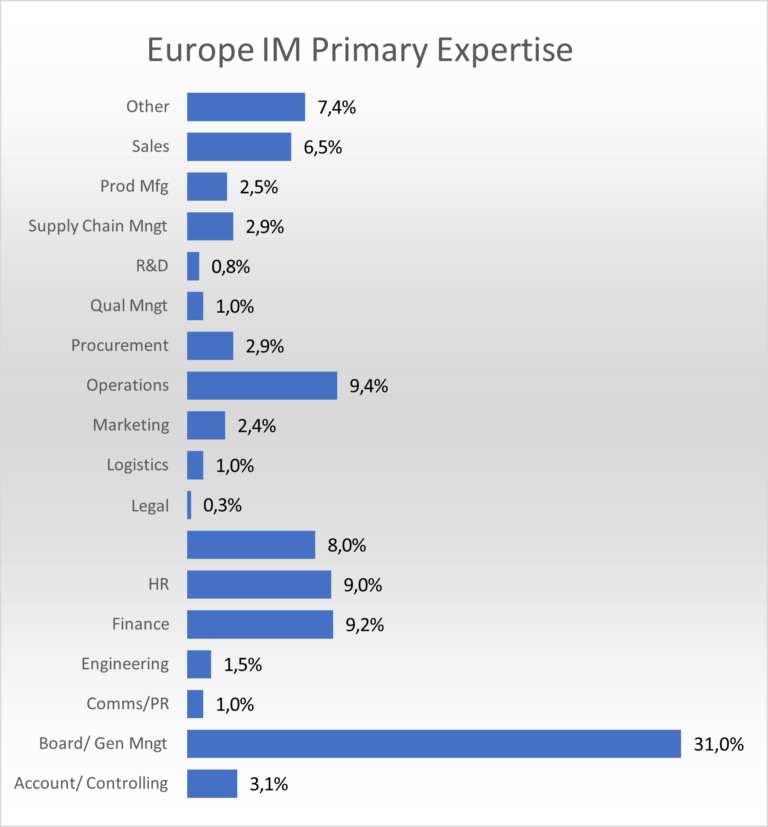Summary
Interim management in Europe, where do we stand?
The latest INIMA study confirms that 2021 has caught up well with 2020, with an overall increase in mission time volume of 7%. In January 2022, this even increased by 12% compared to January 2021. The main countries are Austria and the UK with +16%, and France with +10%.
The European interim manager is close to the French manager
The INIMA (International Network of Interim Manager Association) study shows us that the profile of the European Manager is close to the one we know in France, even if some differences are noticeable:
- Average age: 54 (compared to 56 in France)
- Average experiencein Transition Management: 8 years (compared to 6.2 years in France). France can still progress to join the historical countries of Interim Management such as Germany (8.7), or the United Kingdom (10.5)
- The share of women: 14% (compared to 18% in France). This percentage continues to rise, driven by Poland (23%) and Portugal (22%). Germany is far behind with 9%!
Overall, the trend is towards homogenization of the function, i.e. the share of women is increasing and the age is getting younger. Almost all European countries are now concerned. On the other hand, regarding the scope of application, the missions have diversified widely, with significant differences from one country to another.

To go further – Examples of courses:
Advice from a General Manager on team management
Feedback on the successful transformation of a textile company
Characteristics of Interim Management in Europe
Also according to INIMA, the fields that make the most use of interim management in Europe are General Management (31%), the Operations/Production (9%), the
HRD
(9%), the Financial Departments (9%) and finally the
IT
(8%).
There are relatively large differences between countries. While Finance Departments account for 9.2% of assignments on average in Europe, they account for 13.2% in France and up to 15.1% in the UK.
Moreover, all the components of the company are represented, and this is one of the lessons learned: interim management is a real solution in all departments.
Secondly, the European average for the employment rate of Interim Managers in terms of the number of days over a full year is 63%, i.e. managers work an average of 63% of working days over a year.
For example, in a year consisting of 253 working days, there are 159 days on average for the interim manager, i.e. about 8 months of assignment. France is slightly below, Germany has the highest average with 81%, followed by Portugal with 34%.
The majority of Managers declare themselves to be on full-time assignment in January 2022 (41%), while 25% say they are working
on assignment
à
shared time
.
Types of Interim Management assignments in Europe
We often hear about the colossal size of the German interim management market, far ahead of the French market and its other European neighbors. One of the key factors that has boosted the market across the Rhine over the past 10 years is the diversification of assignments.
Between the missions linked to the increase of activity in the industry, the missions of
bridge management
transformation projects, or even
crisis management
Germany has been able to take advantage of all the facets of interim management in the private and public sectors.
At the European level, the main missions remain those of transformation projects. Unsurprisingly, the industrial sector remains the leader, although here again, all sectors are equally affected.

On the client side, 31% of companies using interim managers are smaller than 100 employees, and 40% are larger than 500 employees. There are major disparities from one country to another, depending on the economic fabric. Italy has 65% of clients with less than 100 employees, and Spain has 63%. In contrast, France, Germany and the United Kingdom have 49%, 57% and 62% of assignments in companies with more than 500 employees respectively.
Within
MOMEN
we intervene in all sectors of activity for all types of top management functions, both in relay management and in transformation projects. Like a diversified market, we believe that an interim manager can intervene in several mission situations and often in several sectors of activity.
